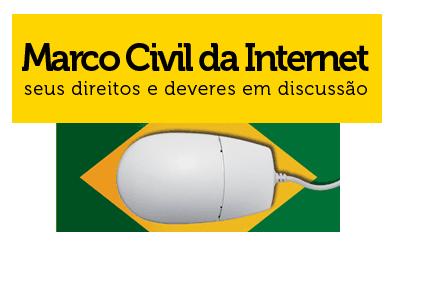Brazilian Congress and lobbyists kill world first internet Bill of Rights
The Brazilian Congress’ lower house has killed a draft bill that would have pioneered the world’s first “Internet Bill of Rights.” Feted by free-speech activists and negotiated over several years, the bill used a civil rights framework to guarantee basic rights for internet users, content creators and online intermediaries — establishing that providers are not responsible for user content.

Marco Civil da Internet | Cultura Digital | CC: BY-NC-SA
The bill, known as Marco Civil da Internet, also guaranteed net neutrality — a move that angered the telecommunications industry as it would prevent internet service providers (ISPs) from implementing a two-tier flow of internet traffic. ISPs worldwide are keen to charge differentiated rates for delivering digital content, this would enable the industry to charge either content providers or consumers more for delivering some kinds of internet traffic, such as movies.
A vote on the draft bill scheduled to take place in the Chamber of Deputies on 20 November was postponed. It was the fifth time in the last two months that a vote on Marco Civil was pushed back after legislators failed to agree on the text. House Speaker Marco Maia has now removed Marco Civil from the list of draft bills on Brazilian lawmakers’ agenda — meaning it will not be bought back to the floor.
The main reason for Marco Civil’s failure was a lack of consensus on the issue of net neutrality. Deputy Alessandro Molon, who sponsored the bill, says Brazil’s main telecommunication companies lobbied hard against it, arguing it was contrary to the principles of the free market.
Other elements of the bill also created controversy — copyright holders were angered by the legal protections offered to internet intermediaries who host or transmit content shared or created by third parties (companies like Google and Facebook). The draft bill stated that such third party content should only be deleted after a court order. Detractors say this process should be faster and simpler, and providers should be able to remove content after being merely notified by offended parties — an argument seen by analysts and activists as a risk to free speech.
The companies’ case apparently influenced key members of Congress and made it impossible to reach an agreement on Marco Civil’s final text. Although industry lobbies were successful in watering down key user protections, their legislative surrogates wanted to impose even greater changes on the text.
After Marco Civil’s failure on Tuesday, Molon said it was up to society to put pressure on deputies to push the draft bill to the floor. He was also critical of big companies that had “their interests frustrated” by Marco Civil.
Molon was supported by the countries President Dilma Rousseff and Vice-President Michel Temer — president of PMDB Party, the main ally to Rousseff’s Workers’ Party in Congress. Despite their respective parties having a substantial legislative majority Rousseff’s and Temer’s support of Marco Civil was rendered ineffectual after lawmakers — mainly from PMDB — took issue with key elements.
The failure of Marco Civil was denounced by activists all around the internet. The Pirate Party founder Rick Falkvinge called the episode a “political fiasco” in which Brazil wasted a chance to gain world-wide influence on free speech issues.
“[The Marco Civil obstruction] follows a ridiculous watering-down and dumbing-down of the bill, at the request of obsolete industry lobbies. Having been permanently shelved, this means that Brazil has practically killed its chance of leapfrogging other nations’ economies”, said Falkvinge on his website.
“Marco Civil could be an advance not only for Brazil, but for all countries, on how to discuss law enforcement on the online world — and its consequences”, said André Pase, Digital Communication professor at PUC University in Porto Alegre.
“A legal framework could go beyond regular laws that get easily obsolete in a context of innovation, where fresh, free online services are born all the time.”
Rafael Spuldar is a journalist based in São Paulo

 In a world where digital policy is written by politicians who barely know how to send an email, Marietje Schaake is a breath of fresh air. Marta Cooper meets the pioneering Dutch MEP
In a world where digital policy is written by politicians who barely know how to send an email, Marietje Schaake is a breath of fresh air. Marta Cooper meets the pioneering Dutch MEP